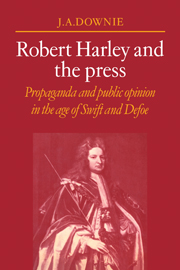Epilogue: impeachment and after
Published online by Cambridge University Press: 07 October 2011
Summary
On 6 August 1714 Oxford wrote to George I, offering his congratulations on the new king's accession to the throne. ‘I had the honour in the two preceding reigns to express my love to my country by promoting what is now come to pass’, he pointed out, ‘your majesty's succession to the crowns of these kingdoms’. This was no mere cant. Of the three men who had assisted William III in the drafting of the bill of settlement, only Oxford was still living. Rochester died in 1711; Godolphin in 1712. In many ways it would have been true to say that of living Englishmen, the former lord treasurer, despite whig fears, had done most to secure the peaceful succession of the Hanoverians. He regarded it as his life's work.
But his day was over. Oxford was greeted silently and coldly by the new king. Inactivity gave way to illness soon after George I's landing in England.
What gave great Villiers to th' assassin's knife,
And fixed disease on Harley's closing life?…
What but their wish indulg'd in courts to shine,
And pow'r too great to keep, or to resign?
Johnson's cynicism overlooks Oxford's two-year confinement in the Tower of London. It was this that finally broke his health. Bolingbroke fled to the court of the Pretender at St Germain to forestall impeachment. Whig malice lighted on Oxford. On 11 April 1715 a secret committee was appointed to look into the suspected mismanagements of his ministry.
- Type
- Chapter
- Information
- Robert Harley and the PressPropaganda and Public Opinion in the Age of Swift and Defoe, pp. 185 - 196Publisher: Cambridge University PressPrint publication year: 1979



